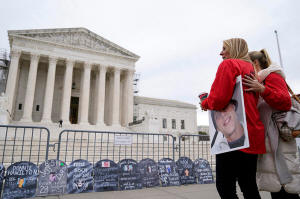Latest opioid settlement plan with OxyContin maker Purdue and Sackler
family getting few objections
[November 14, 2025]
By GEOFF MULVIHILL
NEW YORK (AP) — Lawyers representing OxyContin maker Purdue Pharma,
branches of the Sackler family that own it, cities, states, counties,
Native American tribes, people with addiction and others across the U.S.
are expected to deliver a nearly unanimous message for a bankruptcy
court judge Friday: Approve a plan to settle thousands of opioid-related
lawsuits against the company.
If U.S. Bankruptcy Judge Sean Lane abides, it will close a long chapter
— and maybe the entire book — on a legal odyssey over efforts to hold
the company to account for its role in an opioid crisis connected to
900,000 deaths in the U.S. since 1999, including deaths from heroin and
illicit fentanyl.
Closing arguments were expected Friday in the third day of a hearing
over a bankruptcy plan for the company, which filed for protection six
years ago as it faced lawsuits with claims that grew to trillions of
dollars.
The opposition is much quieter this time around
The saga has been emotional and full of contentious arguments between
the many groups that took Purdue to court, often exposing a possible
mismatch between the quest for justice and the practical role of
bankruptcy court.
The U.S. Supreme Court rejected a previous deal because it said it was
improper for Sackler family members to receive immunity from lawsuits
over opioids. In the new arrangement, entities who don't opt into the
settlement can sue them. Family members are collectively worth billions,
but much of their assets are held in trusts in offshore accounts that
would be hard to access through lawsuits.
This time, the government groups involved have reached an even fuller
consensus and there's been mostly subdued opposition from individuals.
Out of more than 54,000 personal injury victims who voted on whether the
plan should be accepted. just 218 said no. A larger number of people who
are part of that group didn't vote.

A handful of objectors spoke Thursday at the hearing, sometimes
interrupting the judge. Some said that only the victims, not the states
and other government entities, should receive the funds in the
settlement. Others wanted the judge to find the members of the Sackler
family criminally liable — something Lane said is beyond the scope of
the bankruptcy court, but that the settlement doesn't bar prosecutors
from pursuing.
A Florida woman whose husband struggled with addiction after being given
OxyContin following an accident told the court that the deal isn't
enough.
“The natural laws of karma suggest the Sacklers and Purdue Pharma should
pay for what they have done,” Pamela Bartz Halaschak said via video.
Deal would be among the biggest opioid settlements
A flood of lawsuits filed by government entities against Purdue and
other drugmakers, drug wholesalers and pharmacy chains began about a
decade ago.

[to top of second column]
|

Jen Trejo holds a photo of her son Christopher as she is comforted
outside the Supreme Court Dec. 4, 2023, in Washington. (AP
Photo/Stephanie Scarbrough, File)
 Most of the major ones have already
settled for a total of about $50 billion, with most of the money
going to fight the opioid crisis.
The Purdue deal would rank among the largest of them. Members of the
Sackler family would be required to pay up to $7 billion and give up
ownership of the company. None have been on its board or received
payments since 2018. Unlike a similar hearing four years ago, none
were called to testify in this week's hearing.
The company would get a name change and new overseers who would
dedicate future profits to battling the opioid crisis.
There are also some non-financial provisions. Certain members of the
Sackler family would be required to give up involvement in companies
that sell opioids in other countries.
Family members would also be barred from having their names added to
institutions in exchange for charitable contributions. The name has
already been removed from museums and universities.
And company documents, including many that would normally be subject
to lawyer-client privilege, are to be made public.
Some people hurt by Purdue’s opioids would receive some money
Unlike the other major opioid settlements, individuals harmed by
Purdue’s products would be in line for some money as part of the
settlement. About $850 million would be set aside for them, with
more than $100 million of that amount carved out to help children
born dealing with opioid withdrawal.
About 139,000 people have active claims for the money. Many of them,
however, have not shown proof that they were prescribed Purdue’s
opioids and will receive nothing. Lawyers expect that those who had
prescriptions for at least six months would receive about $16,000
each and those who had them more briefly would get around $8,000.
Legal fees would reduce what people actually receive.
One woman who had a family member suffer from opioid addiction told
the court by video Thursday that the settlement doesn't help people
with substance use disorder.
“Tell me how you guys can sleep at night knowing people are going to
get so little money they can’t do anything with it,” asked Laureen
Ferrante of Staten Island, New York.
Most of the money is to go to state and local governments to be used
in their efforts to mitigate damage of the opioid epidemic. Overdose
death numbers have been dropping in the past few years, a decline
experts believe is partly due to the impact of settlement dollars.
All contents © copyright 2025 Associated Press. All rights reserved |